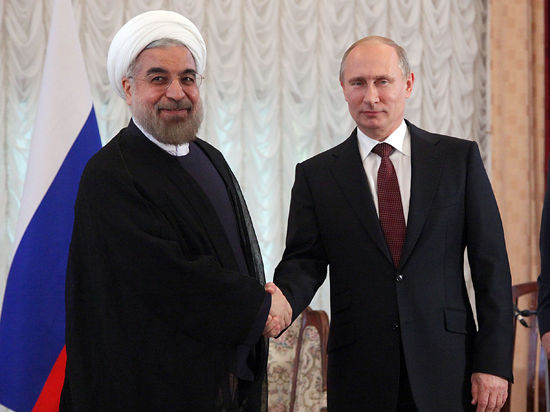Putin, Rouhani discuss legal status of Caspian Sea

By Kamila Aliyeva
Russia and Iran intend to expand cooperation in the Caspian Sea, Russian President Vladimir Putin and his Iranian counterpart Hassan Rouhani said in a joint statement following the bilateral talks held in Moscow on March 28.
"The parties spoke in favor of further expanding all-round cooperation in the Caspian Sea, including creation of guarantees for peace, stability and security in the region, the safety of navigation, transit and multimodal transport, sustainable development, environmental protection, protection and management of aquatic biological resources, counteraction to oil pollution, as well as trade, tourism and marine scientific research," the statement reads.
Given the forthcoming fifth Caspian Summit in Astana this year, the heads of the two states consider it expedient to complete the preparation of the Convention on the Legal Status of the Caspian Sea as soon as possible.
This convention should become the basic international treaty regulating the activities of the parties on the Caspian Sea. Its main principles were agreed upon by the presidents of Russia, Azerbaijan, Iran, Kazakhstan and Turkmenistan at the fourth Caspian summit.
The Caspian Sea is surrounded by the five coastal countries of Azerbaijan, Iran, Kazakhstan, Russia and Turkmenistan. The Sea has a total surface area of 371,000 km², holding 78,200 cubic km of water.
The legal status of the Caspian Sea has remained unsolved during the past two decades, preventing development and exploitation of its disputable oil and gas fields and creating obstacles to the realization of major projects.
Russia, Kazakhstan, and Azerbaijan hold to the principle of dividing into national sectors based on the “median line” principles since it is an international boundary lake, and leaving the sea surface for general use, i.e. they are for demarcation of mineral resources and the Caspian Sea shelf, but against dividing up its waters.
Iran seeks an equal division of the Caspian into 5 even sectors, mainly because most of the offshore energy resources are located away from the Iranian coastline. Turkmenistan also demands the division of the Sea into equal parts between the pre-Caspian countries so that each country has 20 percent of the sea.
The Caspian littoral states signed a Framework Convention for the Protection of the Marine Environment of the Caspian Sea in November 2003.
---
Kamila Aliyeva is AzerNews’ staff journalist, follow her on Twitter: @Kami_Aliyeva
Follow us on Twitter @AzerNewsAz
Here we are to serve you with news right now. It does not cost much, but worth your attention.
Choose to support open, independent, quality journalism and subscribe on a monthly basis.
By subscribing to our online newspaper, you can have full digital access to all news, analysis, and much more.
You can also follow AzerNEWS on Twitter @AzerNewsAz or Facebook @AzerNewsNewspaper
Thank you!
